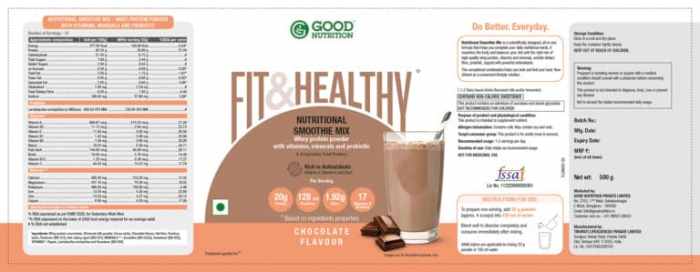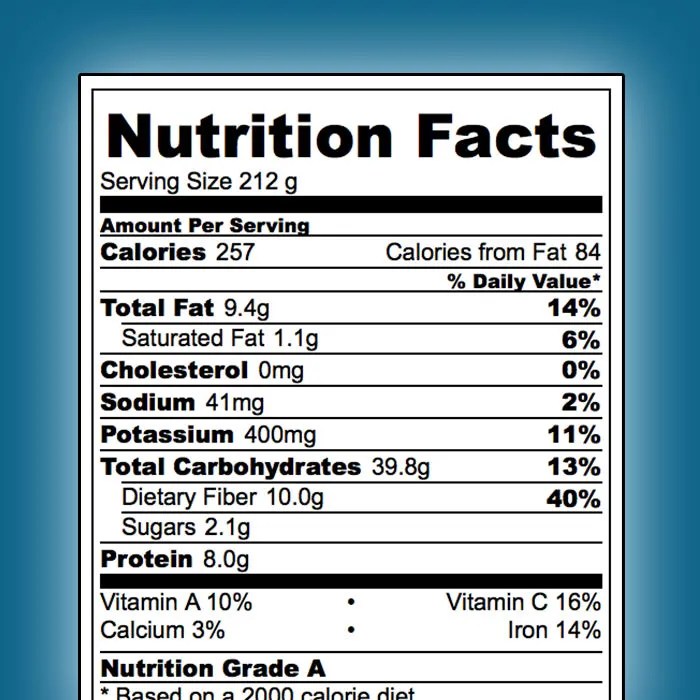Too Good Smoothies

Too good smoothies nutrition facts – The market for pre-packaged smoothies is booming, fueled by promises of convenient nutrition and a quick, healthy meal replacement. But how accurately do these “too good to be true” smoothies reflect their marketing claims? Let’s delve into the often-blurred line between advertised benefits and the actual nutritional content of these popular beverages.
Marketing Claims and Their Accuracy
Smoothie manufacturers frequently employ persuasive marketing strategies to entice consumers. Common claims include “packed with antioxidants,” “a great source of protein,” “a perfect post-workout recovery drink,” and “a healthy way to start your day.” While some smoothies might contain beneficial ingredients, the extent to which these claims hold true often varies significantly. Many rely on suggestive imagery and vague language, leaving consumers to interpret the nutritional value based on emotional appeals rather than factual information.
The reality is that many commercially produced smoothies are high in added sugar, low in fiber, and contain less of the advertised beneficial nutrients than one might expect.
Discrepancies Between Advertised and Actual Nutritional Content
A critical examination reveals substantial discrepancies between the advertised nutritional information and the actual nutritional content in many commercially produced smoothies. For example, a smoothie might advertise a high protein content, but upon closer inspection, a significant portion of that protein might come from a less bioavailable source, like whey protein isolate, which the body doesn’t absorb as efficiently as protein from whole foods.
Similarly, claims of high antioxidant levels often fail to specify the types and quantities of antioxidants present, making it difficult for consumers to assess the actual health benefits.
Too Good Smoothies boast impressive nutrition facts, packed with fruits and vegetables. But for a quick hydration boost with electrolytes, comparing their profile to the detailed breakdown on a liquid iv nutrition facts label offers a fascinating contrast. Ultimately, the best choice depends on your individual needs – a sustained energy release from a smoothie or rapid rehydration from a Liquid IV.
| Nutrient | Advertised Value (Example) | Actual Value (Example) | Discrepancy |
|---|---|---|---|
| Sugar (grams) | 15g | 25g | +10g (67% higher) |
| Protein (grams) | 20g | 15g | -5g (25% lower) |
| Fiber (grams) | 5g | 2g | -3g (60% lower) |
| Vitamin C (mg) | 100mg | 70mg | -30mg (30% lower) |
*Note: These values are illustrative examples and may not reflect the specific nutritional content of any particular smoothie brand. Always refer to the nutrition facts label on the product packaging for accurate information.*
Misleading Marketing Tactics, Too good smoothies nutrition facts
Several misleading marketing tactics contribute to the inaccurate perception of the nutritional value of commercially produced smoothies. One common tactic is the use of suggestive imagery, such as vibrant colors and images of fresh fruits and vegetables, which create an impression of wholesomeness that might not be fully supported by the actual ingredient list. Another tactic is employing vague or ambiguous language, such as “packed with nutrients” or “naturally delicious,” without providing specific details about the nutrient content or the sources of the ingredients.
Furthermore, some manufacturers may strategically highlight certain beneficial aspects while downplaying or omitting information about less desirable components, such as high sugar content or artificial additives. For instance, a smoothie might prominently feature its antioxidant content but bury the information about its high sugar content in the fine print.
Impact of Added Sugars and Sweeteners

The addition of sugars and sweeteners significantly impacts the nutritional profile of smoothies, often overshadowing the inherent benefits of fruits and vegetables. While a smoothie can be a healthy and convenient way to consume fruits and vegetables, the addition of excessive sugars can negate these benefits and contribute to various health problems. Understanding the impact of added sugars is crucial for making informed choices about smoothie consumption.Added sugars and artificial sweeteners, while enhancing taste, dramatically alter the nutritional balance of smoothies.
They contribute empty calories, meaning they provide energy without essential vitamins, minerals, or fiber. This can lead to weight gain, increased risk of chronic diseases, and a decrease in the overall nutritional value of the smoothie. Natural sugars found in fruits are accompanied by fiber and other nutrients, providing a more balanced and beneficial effect on the body.
Conversely, added sugars provide only calories and can disrupt blood sugar levels, leading to energy crashes and increased cravings. Artificial sweeteners, while calorie-free, have also been linked to potential long-term health concerns, although research in this area is ongoing and requires further investigation.
Effects of Added Sugars and Artificial Sweeteners on Nutritional Value
Excessive added sugar diminishes the nutritional density of smoothies by diluting the concentration of vitamins, minerals, and antioxidants naturally present in fruits and vegetables. For example, a smoothie heavily sweetened with refined sugar will have a lower concentration of vitamin C per serving compared to a similarly sized smoothie made with the same amount of fruit but without added sugar.
The added sugar essentially replaces valuable nutrients, leading to a less nutrient-rich beverage. Artificial sweeteners, while not contributing calories, do not offer any nutritional benefits, further diminishing the overall nutritional value.
Health Impacts of High Sugar Content in Smoothies
High sugar intake from smoothies, especially from added sugars, can lead to a range of negative health consequences. These include weight gain and obesity, due to the high caloric density of sugar without satiating fiber. Excessive sugar consumption is also strongly linked to type 2 diabetes, as it contributes to insulin resistance. Furthermore, high sugar intake can increase the risk of cardiovascular disease, non-alcoholic fatty liver disease, and certain types of cancer.
The frequent consumption of high-sugar smoothies can contribute to tooth decay due to the prolonged exposure of teeth to sugar. It’s crucial to remember that these risks are amplified when the sugar comes from added sources rather than naturally occurring sugars in fruits.
Recipe for a Naturally Sweet Smoothie
It is important to prioritize natural sweetness in smoothies. This approach maximizes the nutritional benefits while minimizing the negative health effects associated with added sugars. Below is a recipe that focuses on the natural sweetness of fruits and avoids added sugars:This recipe uses the natural sweetness of fruits and vegetables to create a delicious and healthy smoothie without relying on added sugars or artificial sweeteners.
The combination of fruits and vegetables provides a balance of vitamins, minerals, and fiber, offering a more nutritious and satisfying beverage.
- 1 cup frozen berries (mixed berries, strawberries, or blueberries)
- 1/2 cup spinach or kale
- 1/2 banana (for added creaminess and sweetness)
- 1/2 cup unsweetened almond milk (or other milk alternative)
- 1 tablespoon chia seeds (optional, for added fiber and nutrients)
- 1/2 teaspoon vanilla extract (optional, for flavor)
Question & Answer Hub: Too Good Smoothies Nutrition Facts
Are all “Too Good” smoothies unhealthy?
Not necessarily. Some may have better nutritional profiles than others. However, carefully checking the nutrition label and ingredient list is crucial before purchasing.
How can I make a healthier smoothie at home?
Focus on whole fruits and vegetables, add a source of protein (Greek yogurt, nut butter), and limit added sugars. Experiment with different combinations to find flavors you enjoy!
What are some healthy alternatives to added sugar in smoothies?
Use naturally sweet fruits like bananas or mangoes, or consider a small amount of unsweetened applesauce or dates for sweetness.
Are smoothies a good replacement for a meal?
It depends on the ingredients and the size of the smoothie. A smoothie packed with protein, healthy fats, and fiber can be a satisfying meal replacement, but others may be better suited as a snack.










